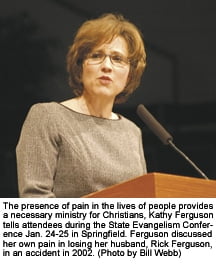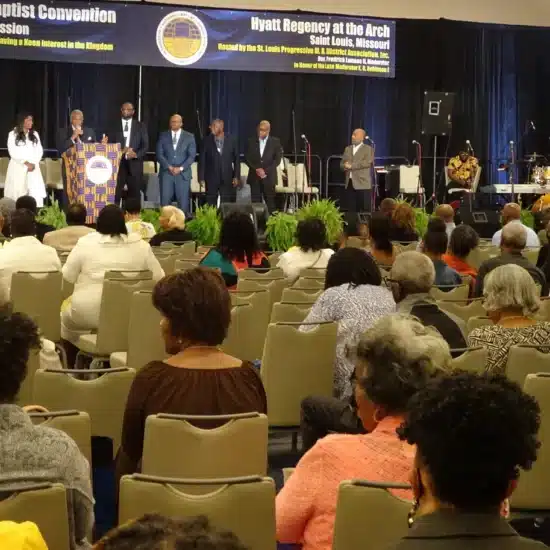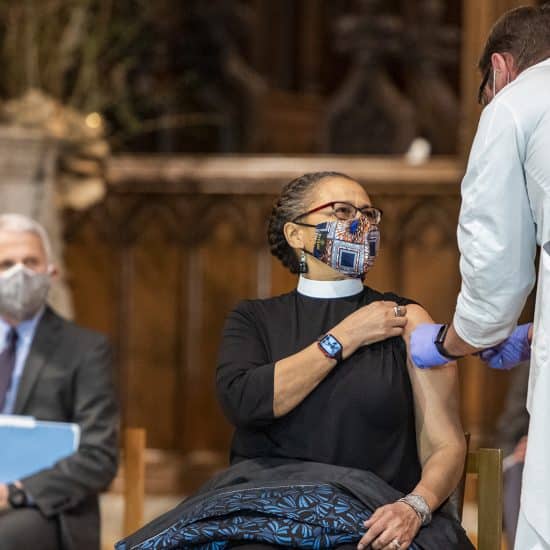By Bill Webb, Word&Way Editor
Springfield — The widow of a prominent Southern Baptist pastor gave insights into her own pain and into ministering with those experiencing pain in a message to the State Evangelism Conference Jan. 24-25 at Second Baptist Church, Springfield.
Kathy Ferguson's husband, Rick, was killed in an accident two-and-a-half years ago while the family was on its way from Denver, Colo., to the Lake of the Ozarks for a vacation. Rick was pastor of Riverside Baptist Church in Denver and a popular speaker nationally at the time of his death.
 "What I want to share with you today are things that I have learned from this journey that God has thrust upon my life," Kathy Ferguson said. "I am not an expert. I am just like you, who thought they had a life planned, and something different happened along the way.
"What I want to share with you today are things that I have learned from this journey that God has thrust upon my life," Kathy Ferguson said. "I am not an expert. I am just like you, who thought they had a life planned, and something different happened along the way.
"There's a strange ministry that comes to us in pain and disappointment and heartache," she said. "We use rhetoric and cliches in church, but I want to tell you, it is a ministry of God."
Ferguson said she had "to make the humbling discovery that my theology and my ministry about pain were crafted from a very, very safe distance from [pain]. And when those things are crafted from a very, very safe distance from it, ministry in that time can appear insensitive, shallow and hollow.
"Someone has said we can all be philosophical about pain until the pain is ours," she said. "We can all be ministerial about the pain until the pain is ours, also."
What happens, she asked, when a 37-year-old housewife is brutally attacked and raped, when a child is molested by a church leader, when a mother prays that her daughter will be pulled from her homosexual desires, when parents pray but their child still dies from leukemia, when a young mother accepts Christ only to lose a husband who wants no part of her religion or when a mom and dad receive the news that their son is profoundly mentally handicapped?
"What happens when a family stands on the side of the road and prays after a horrible accident, yet their loved one still dies?" she asked.
"Those situations can launch us into faith struggles," she acknowledged. "And it's struggles for seekers and believers alike. Those struggles are for people that have Christ in their heart and those struggles are for people that have not entered into a relationship with Him.
"Those broken hearts have limped into church services and they're desperately wanting God to speak to them and answer their questions," she said.
Ferguson offered four suggestions for church members and leaders ministering to people with pain.
"We're going to have to allow for authentic intellect," she said.
"In our culture, the church has a problem with being believable; they don't see us as being authentic."
People do not walk into churches asking, "Is this true?" Ferguson said. "Do you know what they are saying? They're saying, 'Is this real?'
"God created us with a mind to think deeply," allowing for questions during difficult situations in life, she said. "What do we do with the questions people ask? We allow them to be asked in a safe place. If the body of Christ is not a safe place for questions to be asked about God, where is a safe place?"
In times of hurt, the church must offer good, timely theology, Ferguson added. "I was amazed at the bad theology that surfaced as people tried to console us after Rick's death. Good people. But some of the things they said were ridiculously wrong.
"False explanations about pain can only inflict more hurt."
The church also must allow for authentic emotions, Ferguson said.
"We also are created with the capacity to feel deeply," she said. "Sometimes we gently imply to the hurting that their faith should make all the pain of this life hurt less."
Christians need to be reminded of the example of Jesus in the Garden of Gethsemane, she said. "Do we see a person mechanically surrendering to a hard thing that God is asking Him to do?" On the contrary, she said, Jesus asked if there wasn't another way.
"It didn't negate His obedience, but there was honest expression."
The church must offer authentic compassion, Ferguson said.
"Care and commitment in the process of pain in someone's life is a deep commitment of compassion. Profound theology will not substitute for real compassion. Programs for hurting people…are not substitutes for real compassion," she said.
"Where is God when it hurts?" she asked. God comes to people in pain when Christian people hear the beckoning of the Holy Spirit and respond to them.
Finally, she said, the church must offer authentic hope.
"In the New Testament, hope is that which is certain but not yet revealed," she explained. "That's what biblical hope is."
Hope isn't getting what we want, she said. "What God promises to give us in the Bible is not [just] what we wish would happen. I expected to grow old with Rick, but God never promised that to me. Our hope has to be biblical hope.
"We have to hold out hope to the hopeless," she said. "Comfort one another with the comfort you have experienced in Christ." (02-10-05)






